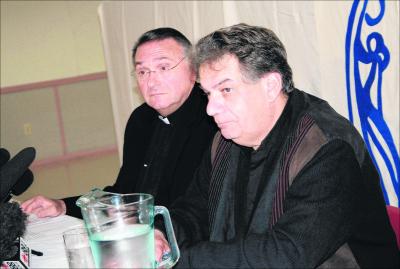Catholic Priests, Workers Expected to Promise Not to Abuse Others
By Lois Legge
Chronicle-Herald
March 20, 2010
http://thechronicleherald.ca/NovaScotia/1173204.html
CANADA -- Everyone from parish priests to building caretakers in the Archdiocese of Halifax and the Diocese of Yarmouth are being asked to sign a new covenant promising not to abuse, endanger or even be alone, in some cases, with people in their care.
It's part of a new protocol that was released by the local Catholic Church on Friday.
 |
| Archbishop Anthony Mancini and Rev. Paul Abbass speak with reporters in Sydney River last year after former Antigonish Bishop Raymond Lahey was arrested on child pornography charges. In the wake of that scandal and other abuse allegations over decades, the Catholic Church is coming out with a Covenant of Care, a protocol spelling out the responsibility of those in positions of power. Photo by Laura Fraser |
The nine-point Covenant of Care comes after highly publicized cases of sexual abuse going back decades and, most recently, the child-pornography charges against Bishop Raymond Lahey, who resigned as the head of the Antigonish diocese last fall just before the allegations came to light. He has been charged with possessing and importing child pornography.
Marilyn Sweet, communications officer for the Archdiocese of Halifax, and Archbishop Anthony Mancini said the Responsible Ministry and Safe Environment Protocol has been in the works for about 18 months but the Lahey case and insurance requirements increased the urgency of getting something in place.
Mancini was out of the province Friday and couldn't be reached for comment.
Sweet acknowledged some of the requirements should have been well-known already, such as the seemingly obvious rule: "All physical contact between staff and volunteers and children, youth or vulnerable adults must be completely non-sexual and based only on the individual's needs. Physical contact when alone with a child or youth will be avoided."
"It's not that people didn't know it," she said. "What it does is, it puts everything in one document and it writes it in a very specific way so that people can pay attention to it in one context."
In addition she said, "There's a general appreciation of course that you don't touch children inappropriately; that an adult is not alone with a child, all those things, that's been common practice.
"We're just recognizing the necessity of writing it down, of putting it in a particular protocol so that it is a written document guiding people's behaviour."
The protocol says:
•Staff and volunteers who learn of imminent danger to children, youth or adults must disclose the information to their immediate superior.
•Staff and volunteers shall not engage in corporal punishment.
•Staff and volunteers must have two others present when dealing with children, youth and vulnerable adults. "For example there should be two persons present in addition to the communicant when bringing communion to those at home."
•Staff and volunteers "will never be alone with a child, youth or vulnerable adult in residence, sleeping facility, locker room, restroom, dressing facility or other closed room or area that is inappropriate to a ministerial relationship" and one-on-one meetings are to be held in rooms or locations "open to public view."
•Staff and volunteers will never take photographs of children, youth or vulnerable adults while they are unclothed or undressing; never provide alcohol, tobacco or illegal drugs; administer any medication without written parental or caregiver permission and never allow anyone who isn't a legal relative to stay overnight in their private accommodations or residences.
The protocol also said "special precautions" must be taken for church or youth ministry-related overnight trips.
Criminal background and child abuse registry checks will now be required for all prospective employees and current parish and ministry workers, including longtime priests who may have never been checked.
But a criminal record won't necessarily mean they'll lose their jobs. A conviction for marijuana possession 40 years ago, for instance, might be considered something minor enough to overlook, Sweet said.
In a letter to priests, deacons and parishioners that was dated Feb. 15 and attached to the new protocol, Mancini acknowledges the "emotional and spiritual suffering experienced by so many" because of the allegations against Lahey.
He said that he has consulted with clergy and lay people for recommendations and that they have consistently called for "a more transparent, open and accountable church."
He said he hired a professional human resources firm to help the church respond and notes that the Archdiocese's insurers "have required the implementation of specific measures for February 15th, 2010."
The protocol is effective immediately, the letter said.
"With this step, I want to assure all our Catholic faithful and, indeed, the whole community of our intention to improve and maintain a safe environment for a more responsible ministry as well as develop a more effective process of accountability respectful of the needs of all," Mancini wrote.
The protocol affects about 80 parishes.
"The goal is to . . . emphasize that the environment is a safe environment and that those who are engaged in these ministerial relationships are behaving responsibly," said Sweet.
She acknowledged sexual abuse victims and others may see the measures as long overdue.
"I think it's long overdue for everybody right across our society. We're all in the midst of this," she said. "It has taken longer for those of us in the church to standardize these protocols and to bring them into practice right across the whole diocese."
(llegge@herald.ca)
'We're just recognizing the necessity of writing it down, of putting it in a particular protocol so that it is a written document guiding people's behaviour.'
Marilyn SweetCommunications officer, Archdiocese of Halifax
Any original material on these pages is copyright © BishopAccountability.org 2004. Reproduce freely with attribution.